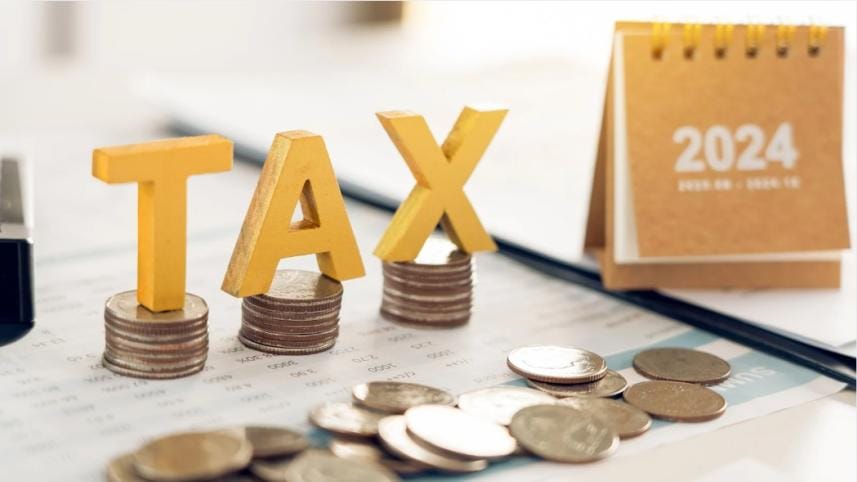65% registered taxpayers skipped filing returns. Why?

Tax compliance is a vital pillar of a country's economic stability. But in Bangladesh, despite various government efforts to widen the tax net, an alarming 65 percent of eligible taxpayers did not bother filing their returns within the deadline, which was extended thrice this year.
That means two out of every three taxpayers are yet to submit their income tax returns, a document filed with a tax authority that reports income, expenses, and other relevant financial information.
As of February 16 this year, only 39.86 lakh taxpayers, including 13,066 companies, filed their tax returns out of around 1.14 crore taxpayer identification numbers (TINs) holders, according to the National Board of Revenue (NBR).
This creates revenue shortfalls, deepens economic inefficiencies, and dampens the effectiveness of tax administration.
All these are happening at a time when Bangladesh has one of the lowest tax-GDP ratios in the world despite posting high economic growth over the past decade.
The failure of a significant portion of registered taxpayers to file returns has several other negative repercussions.
The government has lost a substantial amount of potential revenue, affecting its ability to invest in infrastructure, education, healthcare, and other critical sectors.
Tax collection against the submitted returns declined 1.53 percent year-on-year from income tax, although the number of returns increased by 150,000 during July 1 to February 16.
On the other hand, in the first half of fiscal year (FY) 2024-25, overall tax revenue, including value-added tax (VAT) and customs, fell nearly 25 percent short of the annual Tk 480,000 crore target, and actual collection declined nearly 1 percent year-on-year.
To offset direct tax losses, the government often raises VAT and indirect taxes, disproportionately burdening lower-income groups.
Meanwhile, non-compliance by many taxpayers shifts the tax load onto a smaller group, risking long-term compliance.
For example, the interim government in January imposed value-added tax and supplementary duties on nearly 100 goods and services. However, amid widespread criticism, the authorities withdrew duties from ten items.
Additionally, insufficient tax revenue limits the government's ability to improve essential public services, ultimately impacting economic development and social welfare.
A weak tax compliance culture can also discourage foreign and domestic investment, as businesses seek stable and predictable tax environments. At the same time, the country is struggling to repay foreign loans and their interest.
In the first half of FY25, Bangladesh's foreign debt servicing rose 27 percent year-on-year. In local currency, the payments increased to Tk 23,675 crore from Tk 17,240 crore, intensifying pressure on public finances.
Several factors contribute to the low return filing rate in Bangladesh.
One major reason is the lack of awareness and tax literacy. Many individuals and businesses, particularly in rural areas, remain unaware of their tax obligations.
Additionally, the process of filing returns is often seen as cumbersome and time-consuming, discouraging taxpayers from complying.
Weak enforcement mechanisms further exacerbate the problem. Despite legal obligations, tax laws are not strictly enforced, allowing many to avoid filing without facing consequences.
The prevalence of the informal economy also plays a significant role, as many potential taxpayers do not feel the need to file returns.
Although e-filing has grown, many still find it challenging to navigate. While overall compliance remains low, the submission of e-returns has seen a significant rise of 175 percent, reaching 14.31 lakh this fiscal year.
This shift indicates an increasing adoption of digital tax filing systems, which could help improve compliance in the future.
Furthermore, a lack of trust in how tax revenues are utilised discourages compliance, with some taxpayers believing that their contributions do not translate into tangible public benefits.
Currently, a TIN is required to avail of around 51 services, so many people secure it but do not submit tax returns, according to the NBR.
In a report prepared last year, the NBR stated that around 5 lakh people do not submit tax returns as they only needed the TIN for land transfers, while around 4 lakh people availed of TINs to seek specific services.
Over 2 lakh people with TINs have already passed away, and some 3 lakh obtained TINs to migrate abroad for jobs and other purposes, according to the NBR.
Another prime reason is a lack of awareness among taxpayers.
Besides, the NBR found that Bangladesh has around 1.37 lakh inactive companies under the Registrar of Joint Stock Companies and Firms.
A large number of people obtained TINs to get trade licence, but those firms later became dormant.
To address this issue, the NBR must take urgent measures, such as expanding tax awareness campaigns to educate taxpayers on the importance of filing returns.
Simplifying the tax filing process and making digital tax platforms more user-friendly can encourage more participation.
Stricter enforcement measures, including penalties for non-compliance and incentives for timely filing, could also boost compliance.
Furthermore, formalising the informal economy through regulatory reforms and tax incentives can expand the tax base.
Enhancing transparency in tax utilisation by publishing clear reports on revenue collection and spending can help rebuild public trust in the tax system.
Addressing these challenges through a combination of policy reforms, public awareness campaigns, and targeted incentives will be essential for achieving sustainable economic growth.




 For all latest news, follow The Daily Star's Google News channel.
For all latest news, follow The Daily Star's Google News channel.
Comments